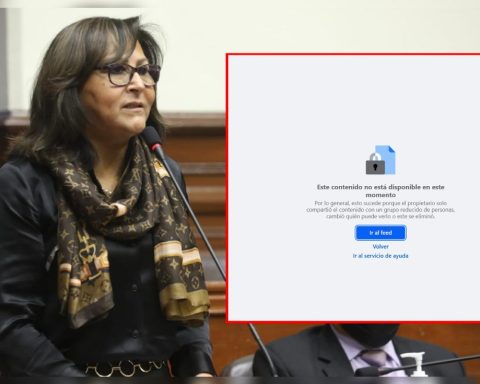Liz Truss has resigned, and the UK is an orphan again. He couldn’t take the pressure of the last week, in which he lost two of the most important members of his initial cabinet, and saw his economic vision completely crumble.
“I recognize that, in this situation, I cannot keep the promises I made to the Conservative Party. I am resigning as leader,” Liz Truss announced, during a statement outside 10 Downing Street.
After the chaotic and dirty episode in the House of Commons, in which the Conservatives put the Government of Liz Truss to a vote, and she herself forgot to vote in favor of her survival because she was busy shaking a colleague, the prime minister asked for a meeting with Sir Graham Brady, Chairman of the 1922 Committee.
This entity is in charge of managing the leadership issues of the Conservative Party, and has the final decision on whether to impeach Liz Truss. In front of Brady, the British officially presented her resignation. She couldn’t stand the insistence of her own block; there were more and more Tories dissatisfiedly asking for a new leader.
rugged autumn
The resignation of Liz Truss marks a record: hers has been the shortest government in British history, surpassing that of the Conservative George Canning, who lasted 119 days in office until his death from tuberculosis. Since her appointment on September 6, Truss has been in power for just 44 days.
A month and little that gave much. In that time, Truss buried Queen Elizabeth II, the pound, and the reputation of the Conservative Party. He had won the internal elections after the resignation of Boris Johnson with promises of a bold fiscal plan that backfired: his drastic tax cuts, designed to boost British entrepreneurship, plunged the country into an energy crisis and another of the cost of life.
As September drew to a close, and Liz Truss’s first month in office, global markets punished her fiscal decisions. The pound reached its lowest value in the last 37 years, at 1.10 below the dollar. From the opposition, the Labor Party accused Truss of “gambling the British economy”, and the International Monetary Fund warned Downing Street that its tax plan would increase economic inequality and inflation.
Even then, the polling agency YouGov predicted a 33-point lead in support for Labour, and Truss’s reputation was quantified in negative numbers.
October only made things worse. Gradually, the dynamic duo of Truss and his close friend Kwasi Kwarteng, whom he appointed Chancellor of the Exchequer, began to go back on some of his election promises. It was not enough; public opinion of Truss continued to decline, and he was forced to make drastic decisions.
On October 14, the Prime Minister fired Kwarteng and replaced him with Jeremy Hunt, nicknamed by the BBC “a safe pair of hands” Eternal second and veteran in the presidential cabinet (Hunt was Minister of Health in 2012, and Foreign Minister in 2019), this Conservative with leadership ambitions wanted to bring stability and relief to the country’s economy.
But it was another misstep for Liz Truss’s reputation. As soon as he took office, Hunt overturned one by one the fiscal measures proposed by the prime minister in September, and imposed an economic vision that had a good effect on the markets, but left his leader’s vision on the ground. The Agency’s Post Survey YouGov It indicated that 46% of the British believed that Hunt is the one who runs the Government, compared to 21% who still believe in Truss’s authority.
When stability seemed to be just around the corner, Truss suffered a new blow from his cabinet. The Minister of the Interior, Suella Braverman, presented her resignation through a letter loaded with criticism against the Prime Minister: “We have broken our promises, and I am concerned about the direction our Government is taking,” the woman wrote.
His voice was added to those of many others who called for a change of leader. Among them was also the former Brexit minister, Lord Frost.
«Liz Truss must leave as soon as possible. Her successor, whoever she is, has to be competent, effective, and a good communicator,” the former minister wrote in a column for the Telegraph.
The day before his resignation, the same agency published results that broke another record: 77% of those surveyed rejected the management of the Conservative Government, the highest figure recorded by YouGov in the last 11 years. In addition, 87% of these people thought that Liz Truss was mismanaging her finances.
And now that?
The Conservative Party regulations stipulate that the first year of government of a new prime minister is a grace period. Therefore, Liz Truss should have been protected against motions of no confidence. However, the 1922 Committee is free to change its own rules, especially if it is under pressure like the one the Tories dissatisfied exercised regarding the ‘Truss affair’.
The resignation of the prime minister will trigger internal elections, identical to the ones that brought her power after the problem with Boris Johnson. To shorten the process, however, this time only MPs from the Conservative Party will vote. Liz Truss She will remain prime minister until she has a successor.
The names that the British press is already considering are the same as in the summer: Rishi Sunak, Penny Mordaunt, Jeremy Hunt, and even Boris Johnson himself, who is currently the favorite in the polls.
Information and photo credits: eldebate.com











